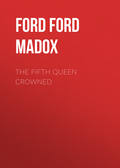"When they were come to Hutton Ha'
They ride that proper place about,
But the laird he was the wiser man,
For he had left nae gear about."
Border Ballad.
PART I
I
In the darkness Young Lovell of the Castle rose from his knees, and so he broke his vow. Since he had knelt from midnight, and it was now the sixth hour of the day, he staggered; innumerable echoes brushed through the blackness of the chapel; the blood made flames in his eyes and roared in his ears. It should have been the dawn, or at least the false dawn, he thought, long since. But he knew that, in that stone place, like a coffer, with the ancient arched windows set in walls a man's length deep, it would be infinitely long before the light came to his eyes. Yet he had vowed to keep his vigil, kneeling till the dawn …
When the night had been younger it had been easier but more terrible. Visions had come to him; a perpetual flutter of wings, shuddering through the cold silence. He had seen through the thick walls, Behemoth riding amidst crystal seas, Leviathan who threw up the smoke and flames of volcanoes. Mahound had passed that way with his cortège of pagans and diamonded apes; Helen of Troy had beckoned to him, standing in the sunlight, and the Witch of Endor, an exceedingly fair woman, and a naked one, riding on a shell over a sea with waves like dove's feathers. The Soldan's daughter had stretched out her arms to him, and a courtesan he had seen in Venice long ago, but her smile had turned to a skull's grinning beneath a wimple. He had known all these for demons. The hermit of Liddeside with his long beard and foul garments, such as they had seen him when they went raiding up Dunbar way, had swept into that place and had imperiously bidden him up from his knees to drive the Scots from Barnside, but he had known that the anchorite had been dead this three years and, seeing that the Warden of the Eastern Marches and the Bishop of Durham, with all his own father's forces and all theirs, lay in the castle and its sheilings, it was not likely that the false Scots would be so near. Young gallants with staghounds, brachets and Hamboro dogs had bidden him to the chase; magicians with crucibles had bidden him come view their alembics where the philosopher's stone stood revealed; spirits holding flames in their hands had sought to teach him the sin against the Holy Ghost, and Syrians in robes of gold, strange sins. There had come cooks with strange and alluring messes whose odours make you faint with desires, and the buttling friars from friaries with great wine-skins of sack. But all of them, too, he had known for demons, though at each apparition desire had shaken him.
All these he had taken to be in the nature of the very old chapel, since it had stood there over the tiresome and northern sea ever since Christendom had come to the land, and it was proper to think that, just as those walls had seen the murdering of blessed saint Oddry by heathens and Scots whilst he sang mass, and even as pagans and sorcerers had in the old times contended for that ground, now, having done it in the body, in their souls they should still haunt that spot and contend for the soul of a young lording that should be made a knight upon the morrow. But when the tower-warden had churned out four o'clock the bird of dawn had crowed twice…
Three times would have been of better omen. At that moment Satan himself, the master fiend, with legs of scarlet, a bull's hide sweeping behind and horns all gold and aquamarine, had been dancing with mighty leaps above a coal fire, up through which, livid and in flaming shrouds, there had risen the poor souls of folk in purgatory. And with a charter from which there dangled a seal dripping blood to hiss in the coals and become each drop a viper – with this charter held out towards Young Lovell, Satan had offered him any of these souls to be redeemed from purgatory at the price of selling his own to Satan.
He had been about to say that he knew too much of these temptations and that the damnation of one soul would be infinitely more grievous to Our Lady than the temporary sojourn in purgatory of an infinite number. But at the crowing of the cock Satan and his firelit leer had vanished as if a candle had been blown out in a cavern…
There had begun an intolerable period of waiting. He tried to say his sixty Aves, but the perpetual whirling of wings that brushed his brow took away his thoughts. He knew them now for the wings of anxious bats that his presence disturbed. When he began upon his Paters, a rat that had crept into his harness of proof overset his helmet and the prayer went out of his head. When he would have crossed himself, suddenly his foster-brother and cousin, Decies of the South, that should have watched in the chapel porchway, began to snore and cried out in his sleep the name "Margaret." Three times Decies of the South cried "Margaret."
Then Young Lovell knew that the spirits having power between cockcrow and dawn, in the period when men die and life ebbs down the sands – that these spirits were casting their spells upon him.
These were the old, ancient gods of a time unknown – the gods to whom the baal fires were lit; gods of the giants and heroes of whom even his confessor spoke with bated breath. Angels, some said they were, not fallen, but indifferent. And some of the poor would have them to be little people that dwelt in bogs and raths, and others held them for great and fair. He could not pray; he could not cross himself; his tongue clove to his jaws; his limbs were leaden. His mind was filled with curiosity, with desire, with hope. He had a great thirst and the cramp in his limbs. He could see a form and he could not see a form. He could see a light and no light at all.
Yet it was a light. It was a light of a rosy, stealing nature. It fell through one of the little, rounded windows, the shadows of the crab-apple branches outside the wall, moving slowly across the floor. When he looked again it was gone and not gone. Without a doubt some eyes were peering into the chapel; eyes that could see in the dark were watching him. Kind eyes; eyes unmoved. His heart beat enormously…
And then he was upon his feet, reeling and stretching out his arms, with prayers that he had never prayed before upon his lips. Then prudence came into his heart and he argued with himself. It was to himself and to no other man or priest that he had vowed to watch above his harness from midnight to dawning. That was a newish fashion and neither the Border Warden nor the Prince Bishop would ask him had he done it or no. They would knight him without this new French manner of it. Then he might well go to see if the dawn were painting the heavens. He fumbled at the bar and cast the door open, stepping out.
It was grey; the sea grey and all the rushes of the sands. The foam was grey where it beat on the islands at sea and in the no-light the great cliff of his father's castle wall was like grey clouts hung from the mists. He perceived an old witch toiling up the dunes to come to him. She had a red cloak and a faggot over her shoulder. She waved her crutch to make him await her, and suddenly he thought she sailed, high in the air from the heavy sand to the stone at his feet. He thought this, but he could not be sure, for at that moment he was rubbing the heavy sleep from his eyes.
"That ye could do this, well I knew," he said, "but I had not thought to see ye do it over my ground."
Often he had seen the old witch. Sometimes she was in the form of a russet hare, slinking into her bed when he had been in harness without bow or light gun or hounds to chase her with. At other times he had seen her in her red cloak creeping about her affairs in the grey woods by Barnside.
Her filthy locks fell across her red eyes and she laughed so that he repented having spared her life in the woods.
"Gowd ye sall putten across my hand," she said, and her voice was like the wither of dried leaves and the weary creak of bough on bough in a great gale when the woods are perilous because of falling oaks. He answered that he had no gold because he had left his poke in his chest in the castle.
And with great boldness she bade him give her one of the pearls from the cap that hung at his belt. He reached to his left side for his sword, but it lay in the chapel across his armour of damascened steel and bright gold.
"Ye shall drown in my castle well when I have this business redded up," he said, but he wished he had slain her with his sword, for she was a very evil creature and it was not well in him to let her corrupt the souls of his poor. He lifted from his girdle his tablets to write down that the witch must drown, but the tablets the pen and the knife were tangled with their red silken tassels and skeins. A heavy snore came from within the chapel porch where Decies of the South was sleeping against the wall.
"If my bride had not begged your life of me…" the Young Lovell began.
Decies of the South muttered: "Margaret," just at his left hand.
"Bride," the old witch tittered. "Ye shall never plight your troth. But that sleeper shall be plighted to my lording's bride and take his gear. And another shall have his lands."
"Get you back to Hell!" the Young Lovell said.
"Look," the witch cried out.
She pointed down the wind, across the miles of dim dunes underneath where the Cheviots were like ghosts for the snow. The dunes rose in little hummocks amongst grey fields. A high crag was to the left. It was all grey over Holy Island; smoke rose from its courtyard. Dunstanburgh was lost in clouds of white sea spray, and in great clouds the sea-birds were drifting inland in strings of thousands each. Still no sun came over the sea.
The witch pointed with her crutch…
A little thing like a rabbit was digging laboriously at the foot of the crag; it ran here and there, moving a heavy stone.
"That man shall be your master," the witch cried.
A white horse moved slowly across the dunes. It had about it a swirling cloud of brown and a swirling cloud of the colour of pearly shells.
"And that shall be your bane," the witch said, in a little voice. "Ah me, for the fine young lording."
Young Lovell coursed to the shed beyond the chapel yew where his horse whinned at the sound of his voice. He haled out the goodly roan that was called Hamewarts because they had bought him in Marseilles to ride homewards through France; his father and he had been to Rome after his father did the great and nameless sin and expiated it in that journey. He had ridden Hamewarts up from the Castle of Lovell so that, standing in the shed whilst his master kept his vigil, the horse might share his benediction.
The roan stallion lifted his head to gaze down the wind. He drew in the air through his nostrils that were as broad as your palm; he sprang on high and neighed as he had done at the battle of Kenchie's Burn.
The horse had no need of spurs, and young Lovell had none. It ran like the wind in the direction of the white steed at a distance. Nevertheless, the rider heard through the muffled sound of hoofs on the heavy sand the old witch who cried out, "Eya," to show that she had more to say, and he drew the reins of his charger. The sand flew all over him from beneath the horse's feet, and he heard the witch's voice cry out:
"To-day your dad shall die, but you's get none of his lands nor gear. From the now you shall be a houseless man."
But when he turned in his saddle he could see no old beldam in a scarlet cloak. Only a russet hare ran beneath the belly of Hamewarts and squealed like a new-born baby.
Whilst he rode furiously as if he were in chase of the grey wolf Young Lovell had leisure to reflect, he had ample time in which to inspect the early digger and the beclouded horse. At eight o'clock he was to be knighted by the double accolade of the Warden of the Eastern Marches and of the Prince Bishop, following a custom that was observed in cases of great eminence or merit in the parties. And not only was Young Lovell son to Lord Lovell of the Castle, but he had fought very well against the Scots, in the French wars and in Border tulzies. So at eight, that he might not fast the longer, he was to be knighted. It was barely six, for still no sun showed above the long horizon of the northern sea.
It was bitter cold and the little digger, with his back to the rider, was blowing on his fingers and muttering over a squared stone that had half of it muddied from burial. At first Young Lovell took the little man for a brownie, then for an ape. Then he knew him for Master Stone, the man of law.
He cried out:
"Body of God, Master Furred Cat, where be's thy gown?"
And the little man span round, spitting and screaming, with his spade raised on high. But his tone changed to fawning and then to a complacence that would have done well between two rogues over a booty.
"Worshipful Knight," he brought out, and his voice was between the creak of a door and the snarl of a dog fox, though his thin knees knocked together for fear. "A man must live, I in my garret as thou in thy castle bower with the pretty, fair dames."
"Ay, a man mun live," the Young Lovell answered. "But what sort of living is this to be seeking treasure trove on my land before the sun be up?"
"Treasure trove?" the lawyer mumbled. "Well, it is a treasure."
"It is very like black Magic," Young Lovell said harshly. "A mislikeable thing to me. I must have thee burnt. What things a man sees upon his lands before the sun is up!"
"Magic," the lawyer screamed in a high and comic panic. "God help me, I have nothing of Mishego and Mishago. This is plain lawyer's work and if your honour will share, one half my fees you shall have from the improvident peasants."
At the high sound of his voice Hamewarts, who all the while was straining after the white horse, bounded three strides; when Young Lovell took him strongly back, he had the square stone at another angle. Upon its mossed side he saw a large "S" carved that had two crosses in its loops, upon the side that was bare was one "S" with the upper loop struck through.
"Body of God, a boundary stone," he cried out. "And you, Furred Cat, are removing it." He had got the epithet of Furred Cat from talking to the Sire de Montloisir whilst they played at the dice.
"Indeed it is more profitable than treasure-troving and seeking the philosopher's stone," the lawyer tittered, and he rubbed, from habit, his hands together, so that little, triturated grains of mud fell from them into the peasant's poor, boggy grass. "This is Hal o' the Mill's land, and I have moved the stone a furlong into the feu of Timothy Wynvate. There shall arise from this a lawsuit that shall last the King's reign out. Aye, belike, one of the twain shall slay the other. His land your honour may take back as forfeit, and the other's as deodand. I will so contrive it, for I will foment these suits and have the handling of them. By these means, in time, your lordingship may have back all the lands ye ever feu'd. In time. Only give me time…"
The Young Lovell lifted up his fist to the sky. The most violent rage was in his heart.
"Now by the paps of Venus and the thunder of Jove, I have forgotten the penalty of him that removeth his neighbour's landmark! But if I do not die before night, and I think I shall not, that death you shall die. Say your foul prayers, filth, your doom is said…"
Master Stone lifted up both his hands, clasped together, to beg his life of this hot but charitable youth. But Young Lovell had leaped his horse across a dune faster than the words could follow him.
He came upon a narrow strip of nibbled turf running down a valley of rushy sand-hills. Hamewarts guided him. They went over one ridge and had sight of the white horse; they sank into another dale and lost it.
On the summit of the next ridge Hamewarts became suddenly like a horse of bronze and the Young Lovell had a great dizziness. He had a sense of brown, of pearly blue, of white, of many colours, of many great flowers as large as millstones. With a heavy sense of reluctance he looked behind him. The mists were rising like curtains from over Bamborough; since the tide was falling the pall of spray was not so white on Dunstanburgh. Upon his own castle, covering its promontory near at hand, they were hoisting a flag, so that from there the tower warden must have already perceived the sun. From over the castle on Holy Island the pall of smoke was drifting slowly to sea. No doubt in the courtyard they had been roasting sheep and kine whole against the visit of the Warden and the Prince Bishop who would ride on there with all their men by nine of the clock.
In every bay and reedy promontory the cruel surf gnawed the sand; the ravens were flying down to the detritus of the night, on the wet margins of the tide. The lawyer was climbing over the shoulder of a dune, a sack upon his back; a shepherd, for the first time that spring, was driving a flock of sheep past the chapel yew. There was much surf on Lindisfarne.
Suddenly, from the middle of the bow of the grey horizon there shot up a single, broadening beam. Young Lovell waved his arm to the golden disk that hastened over the grey line.
"If you had come sooner," he said to the sun, "you might have saved me from this spell. Now these fairies have me."
Slowly, with mincing and as if shy footsteps, Hamewarts went down through the rushes from that very real world. Young Lovell perceived that the brown was a carpeting that fluttered, all of sparrows. It had a pearly and restless border of blue doves, and in this carpet the white horse stepped ankle-deep without crushing one little fowl. He perceived the great-petalled flowers, scarlet and white and all golden. On a green hill there stood a pink temple, and the woman on the back of the white horse held a white falcon. She smiled at him with the mocking eyes of the naked woman that stood upon the shell in the picture he had seen in Italy.
"But for you," he heard himself think, "I might have been the prosperest knight of all this Northland and the world, for I have never met my match in the courteous arts, the chase or the practice and exercises of arms."
And he heard her answering thoughts:
"Save for that I had not called thee from the twilight."
II
The Warden of the Eastern Marches, who was Henry Percy, fourth Earl of Northumberland, said that there was too much of this silken flummery. He desired to get back to the affairs of King Henry VII and a plain world where there were too many false Scots. The Lord Lovell of the Castle agreed with him, but said that the women would so have it. He was an immense, gross man, the rolls of fat behind his head, growing black curly hair that ran into his black and curly beard, mantled high up on his neck. His eyes were keen, peeble-blue, sagacious and mocking. The Lady Rohtraut, his wife, a fair, thin woman of forty-three, one of the Dacres of the North, leaned across the Bishop Palatine to disagree with the Warden. Thin as she was she wore an immense gown of red damask worked with leaves, birds and pomegranates. Her sleeves brushed the ground, her hood of black velvet had a diamond-shaped front, like the gable of a house, and was framed in yellow gold set with emeralds that her lord had brought from Venice to get her back to a good temper, though he never did. The broad edging of brown fur from her sleeves caught in a crochet of the gilded steel on the Bishop Palatine's armour which had been taken from the Saracens in the year 1482, they having rieved it from the Venetians.
The Lady Rohtraut said that these things had been ordered after the leaves of a written book that had been sent her by her cousin Alice from the King's court in London. This book was called "Faicts of Arms," and the King himself who loved good chivalry had bade it be printed tho' that would be long in doing. There the order of these things had been set forth, and she had done her best to have fashion of it right, though with only men to help her, she imagined that Messire de Montloisir would laugh if he did not happen to be on his bed of sickness.
But she had them there to the number of eleven score, gentry, priests and commonalty with many men-at-arms to hold the herd back with their pike-staves. The great stone hall she had had painted with vermilion, green and gold. Enormous banners with swallow-tails fell from the gilded beams of the roof. They displayed the snarling heads of red tigers, portculles, two-hued roses, and a dun cow on a field of green sarcenet in honour of the Bishop Palatine. The table at which they sat, the men divided from the women, had its silken cloth properly tabled out in chequers of green and vermilion. The pages with their proper badges walked to and fro before the table as they should do, and, as they should be, the people of no privilege were penned in behind the columns of the hall where they made a great noise. She would not have anything lacking at the sacring of her one son.
Sir Walter Limousin, of Cullerford, who had married her daughter Isopel, sneered at these words of his mother-in-law. He sat at the right hand of his father-in-law. Sir Symonde Vesey, of Haltwhistle, who had married the daughter Douce, and sat beyond Sir Walter, said loudly that too much gear went to waste over these Frenchifications of the Young Lovell and his dame. Their two wives said that indeed their mother was over-fond.
Their mother, who was a proud Dacre with the proudest of them, flushed vicious red. She said that her daughters were naughty jades, and if their husbands had not three times each been beggared by Scots raiders they might have had leave to talk so. But, being what they were, it would be better if they closed their mouths over one who had paid all his ransoms, whether to the Scots or on the bloody field of Kenchie's Burn, with sword-blows solely. She had paid one thousand marks to artificers of Brussels for stuffs to deck that hall and the street of the township where it led from the chapel whence her fair, brave son should come; so that banners and carpets hung from the windows, the outer galleries, stairways and the roofs where they were low. And she wished she had spent ten thousand on her son who had won booty enough to pay all she had laid out on him and her daughters' husbands' ransoms besides – after the day of Kenchie's Burn.
The Warden said that he wished by the many wounds of God that the stripling would come. There was too much babble of women there. They had come into these parts, the Bishop of Durham and he, to see what levies might be made from castle to castle and so to broom all false Scots out of the country from thereaways to Dunbar. And there they sate who should have been on the northward road before sunrise listening to this clavering of women. The young Lovell was a springald goodly enow, and the knights of Cullerford and Haltwhistle were known to blow on their fingers when they should be occupied with the heavy swords.
Sir Walter Limousin looked down his nose. He was a grim and silent craven that did little but sneer. Sir Symonde, who was brave and barbarous enough, but unlucky, smote so heavily the silver inkhorn standing before him that it flattened down its supports and stained the chequered fairness of the table.
The Percy cast his old glance aside on Sir Symonde.
"Aye, Haltwhistle," he said drily, "ye will break more than ye will take." And he went on to say that, in his day, he having been dubbed knight on the field, it had been done with a broken sword and the wet on it wiped across his chops to blood him the better. And he wished that Young Lovell would come.
The Lady Rohtraut said that without doubt her son was saying some very long and very precious prayers. The Warden said that belike, and more likely, the young fellow was unable to fasten the whimsy-marees of his new-fashioned harness and was stuck up there in the old chapel like a fool amid the evidences of his folly. The Lord Lovell said nay then, that a band of youngsters had gone up to the chapel, and the little Hal his son's page had reported that his master would soon be there, the page having run, whilst the Young Lovell was riding at a foot pace.
"He had better have kept his page to buckle his harness," the Border Warden harped on.
"Nay then," the Lady Rohtraut said with a flushed and angry face – no person nor page could enter into the sacred chapel till her son should be issued out in his panoply least they should disturb the angels of God who would invisibly assist her son at his harnessing.
The Bishop, whose dark head came out of its steel armour like a cormorant's out of a hole, looked all down that board to find a sympathetic soul. He had a lean, Italianate face, and had pleased the King Richard the Third – then Duke of Gloucester – rather because of a complaisance than a burly strength. He was very newly come to the Palatine Country. For he had been the King's Friend in Rome many years and, in fear of King Henry the Seventh – because the Bishop was reputed a friend of Richard Crookback after Bosworth – he had gone across the seas until now.
So that what with the clerkly details of his coming into the bishopric, this was his first tour of those parts and he did not well know those people. Therefore he had spoken very little.
This John Bishop Palatine was, in short, a cautious and well-advised churchman, well-read not only in the patristic books but in some of the poets, for in his day he had been long in Rome and later dwelt in Westminster, where the printing was done, though the King was even then pulling down Caxton's chapel to build his own more gorgeous fane.
This bishop then, set first the glory of God, good doctrine and his see, as his duty was. And after that he hoped that he might leave renown as a great clerk who had added glory, credit, power and wealth, whether of copes of gold or of lands, to his most famous bishopric.
That was why, throughout this discussion he had observed the face of a young woman that sat beyond the ladies Rohtraut, Isopel and Douce. She was the Lady Margaret of the Wear, coming from the neighbouring tower of Glororem, and that day he was to bless her betrothal to Young Lovell of the Castle. She was a dark girl, rising twenty, and with brownish features, open nostrils, a flush on her face and dark eyes of a coaly-sheen, all of one piece of black, so that you could not tell pupil from iris.
She had never spoken, as became her station, since she was the youngest woman there. But the Bishop Palatine had observed her looks as each uttered his or her thoughts, and from this he knew that she regarded the Lady Rohtraut with tender veneration, and the lower classes behind the pillars with dislike and contempt, for when their voices became loud she had lowered her black brows and clenched her hand that lay along the table.
Upon the Border Warden and upon the gross Lord Lovell she had gazed with a tolerant contempt, upon the Knight of Cullerford with a bitter scorn, upon Haltwhistle with irony, and upon their two wives that should be her sisters-in-law, with high dislike. He perceived that, like the Lady Rohtraut, she had read the book called "Faicts of Arms," for, when the lady Rohtraut had been speaking of it, she had leaned sideways over the table, her lips parted as if she could hardly contain herself. He saw also that she was of great piety, since every time Our Lady was mentioned in that debate she inclined, and when it was Our Lord, she did the like and crossed herself. And this pleased the Bishop Palatine, for these observances were not so often seen as could be done with. Moreover, he knew that, plainly to the eye she had given all her heart – and it was a proud and hot one – to the Young Lovell. At each mention of his deeds her dusky cheeks would flush up to her white forehead and she would pass her gemmed hands before her eyes as if they saw a mist of gladness.
The Bishop was glad that the will of God and the bent of his own mind could let his speech, that he was thinking upon, jump so well with that lady's desires, and so he addressed himself at first to the Lady Rohtraut, young Lovell's proud mother.
He had not, he said, spoken before in that high assembly because he was so newly come among them that, although he well knew that he was their father in God and in a sense their temporal protector, yet he did not wish to show himself to them as a rash and ardent fool by dictating upon matters that he might well know little of.
But still, having listened a decent while to their minds he would say something. Of facts and the practice of arms he would not declare himself all ignorant. He was a churchman, but he was of that church militant that should one day be the Church Triumphant – triumphant there in Heaven, but here in Northumberland, militant very fully. It was true that it would not much become him in those days of comparative peace to strike blows with the iron mace. It was rather his part to stand upon a high place observant of battles and sieges. And, if he wore arms, it was rather as a symbol than as of use. He hoped that, as his reverend and sainted predecessors in the see had done, he might confer on such arms a grace of holiness, and therefore with much travel and research, he had arms as golden as might be found for him by his trusty messengers, that their fair richness might shine to the greater glory of God. For himself he would as lief wear sackcloth and rusty pots.
In most things he must bow to the wiseness of the Earl of Northumberland. Being blooded upon a hot field with spurs gilded with the tide from the veins of men had produced very good men. It had doubtless produced better men than to-day might see the doubles and counterparts of. Those days before had been simpler and better. These days were very evil. There was in the land a spirit of luxury, sinful unless it had guidance, bestial unless it had control, and for want of counsel horrid, lecherous and filthy by turns. Theirs, by the will and blessing of God and by the wise rule of His vice-gerent – for so he would style their good King, though it was not the habit – theirs were days of near peace. The kingdom was no longer rent by dissensions; famine and pestilence came more seldom nigh them than in the days of their fathers of which they had read. In consequence, they had great wealth such as had never before been seen. Where their fathers had had woollens they had silks, satins and patterned damasks beyond compare for lascivious allurements; where their fathers had eaten off trenchers of bread, they had plates of silver, of gold, of parcel gilt or at the very least of latten.









